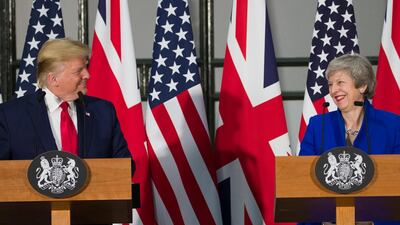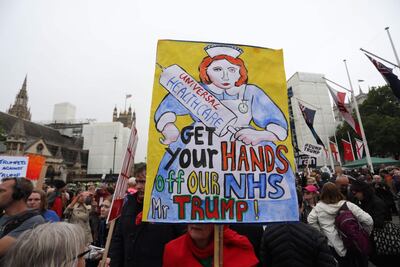US President Donald Trump's visit to the UK this week included trade talks with out-going Prime Minister Theresa May, which are unlikely to lead to any deal amid Brexit uncertainty and an escalating trade war between the US and China, analysts said.
Although talks are taking place, the UK is unable to negotiate the deal formally while still part of the EU and trade experts are dubious about the president’s intentions and whether such a deal would be good for Britain. Some said it will be stacked heavily in favour of the US, with the UK left vulnerable, desperate to do a deal with an isolationist president.
"Comprehensive trade deals take a long time to negotiate and an agreement before the 2020 US elections is highly unlikely," Bart Oosterveld, Director of the Global Business and Economics Program at the Atlantic Council, told The National in an interview.
"Big free trade agreements with significant tariff reductions takes years to negotiate if you have two willing partners," Mr Oosterveld said. "In the best case, this is a complex project of years. If you have the political will and the right people working. This has nothing to do with that.”
Strong trade ties with the US also cannot occur at the same time as with China, he added, pointing to the renegotiated North American Free Trade Agreement (Nafta) which has a provision allowing the US to pull out unilaterally if one of the partner countries enters into a trading relationship with China.
“The list of controversial topics that the US insists on debating in these trade talks is lengthening," he said.
Peter Holmes, fellow at the UK Trade Policy Observatory tells The National that any regulatory alignment with the US would come with costs to the UK.
“UK consumers do not like US food safety standards,” he says. “There are real risks."
If a deal is struck, more US agricultural exports, including chlorinated chicken and hormone-fed beef, could be on the British menu. And although British farmers would be able to import more of their goods to the US under a such an agreement, it would mean giving up a fair amount of its existing trade with the EU.
In a summary of its negotiating aims that were released in February, the US said it wants to “eliminate practices that unfairly decrease US market access opportunities or distort agricultural markets to the detriment of the United States”.
This week, to assuage concerns, Downing Street said that it would not accept any lowering of food or environmental standards when it leaves the EU, making a transatlantic trade deal less likely as US food standards are less stringent than the UK. Liam Fox, the international trade secretary, also attempted to allay fears over US demands, saying on Wednesday that a trade deal wouldn’t force the UK to dilute its food standards or open up the NHS to US companies.
If an agreement with the US was eventually made, Britain’s trade with the EU, currently its biggest trading partner, would take a hit. In 2017, the US accounted for 18 per cent of UK exports and 11 per cent of its imports, according to the Office of National Statistics. This figure is small compared to the EU, which covers 45 per cent of UK exports and 53 per cent of UK imports.
Although the UK will gain from deeper integration with the US in goods and services if a deal signed, it could disadvantage Britain if it bows to unreasonable American demands, analysts said.
In his press conference with Ms May on Tuesday afternoon, Mr Trump said that “everything will be on the table – the NHS, everything”, adding that the outgoing UK leader should stay on beyond her resignation so they can close a trade deal.
The prospect of the NHS being absorbed by large US health companies is one that has concerned campaigners and politicians for years. US pharmaceutical majors have long complained that the foreign health services, including the NHS, don’t pay enough for their drugs. The sitting president has a history of complaining about it too, meaning that a trade deal will likely mean the NHS will have to pay more for US-made medicine.
Mr Trump’s comments that a trade deal would include the NHS were criticised by several MPs, including the Health Secretary and Conservative leadership hopeful Matt Hancock.
Speaking on Twitter, Mr Hancock said: “Dear Mr President. The NHS isn’t on the table in trade talks - and never will be. Not on my watch.”
The president appeared to go back on his comments when he was interviewed by ITV the next day, saying: "I don't see that [the NHS] being on the table. Somebody asked me the question today and I say everything is up for negotiation, because everything is but I don't see that being … that's something I would not consider part of trade. That's not trade."


